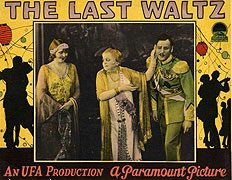| The Last Waltz | |
|---|---|
 American poster | |
| Directed by | Arthur Robison |
| Written by |
|
| Produced by | Charles E. Whittaker |
| Starring | |
| Cinematography |
|
| Music by | Werner R. Heymann |
Production company | |
| Distributed by | UFA |
Release date |
|
Running time | 117 minutes [1] |
| Country | Weimar Republic |
| Languages | |
The Last Waltz (German: Der letzte Walzer) is a 1927 German silent romance film directed by Arthur Robison and starring Liane Haid, Willy Fritsch and Suzy Vernon. It was based on the 1920 operetta Der letzte Walzer by Oscar Straus.